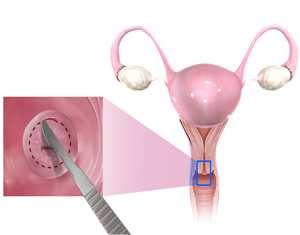
What is a Cervical Biopsy?
The cervix is the lowest anatomical region of the female reproductive system. It is the opening to the uterus or womb and is located between the uterus and the vagina. A cervical biopsy is performed as a diagnostic test to detect cancerous or precancerous cells on the cervix. A cervical biopsy may also be performed by your doctor to diagnose other conditions such as a non-cancerous growth (polyp) on the cervix or to detect genital warts.
Types of Cervical Biopsies
Types of cervical biopsies include:
Punch biopsy: In this procedure a small tissue sample is removed from the cervix using a sharp cutting tool, to check for abnormalities. The tissue cells are then stained with a dye for easier visualisation under the microscope.
Cone biopsy: In this procedure, a laser or scalpel is used to remove cone-shaped pieces of tissue from the cervix.
Endocervical curettage (ECC): In this procedure, a narrow instrument called a curette is used to scrape tissue from the lining of the endocervical canal, the area between the vagina and the uterus.
Cervical Biopsy Procedure
A cervical biopsy is performed under local or general anaesthesia depending on the type of biopsy to be done. During the procedure, the cervix is first cleaned and an instrument called a speculum is inserted into the vagina to keep the canal open during the procedure. Your doctor removes the abnormal tissue with instruments such as a scalpel, forceps or a curette and sends the specimen to the laboratory for microscopic examination. The incision is then closed with absorbent material to reduce bleeding. However, not all biopsies require this process.
Risks and Complications
Like all invasive procedures, a cervical biopsy may be associated with certain risks such as heavy bleeding, infection, and pain.






